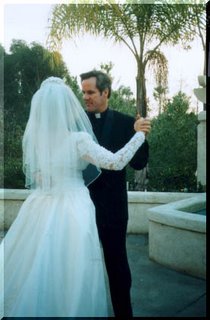A few weeks ago, I was in the "Religion" section at Barnes and Noble. This is not an unusual occurance, but something unique did happen this time. I overheard a conversation between two college-aged women standing near me about the Real Presence of Christ in the Sacrament of the Lord's Supper. I was eventually invited into the conversation, and after explaining my own views one of the young ladies, looking somewhat perplexed, asked me why I am not Roman Catholic and suggested that I sounded like I might be on my way to becoming one. I responded that in fact, I AM already catholic - just not Roman Catholic. Like any good evangelical Catholic (whom I always count it a pleasure to bump into) she was undetered and asked why then I am not Roman Catholic. Clarifying this question for myself and others is the whole reason for my blogs that will be tagged at the bottom with the "
reformed Catholicity" category tags. As a United Methodist, I am a catholic Christian, but not a Roman Catholic.
That day in the bookstore two reasons for not submitting to Rome immediately came to mind: 1) manditory clerical celibacy and 2) the betrayal of the Eastern Patriarchs and Eastern Churches in general by the Latin West that took the form of the pope's adding the
filioque to the Nicene Creed without a full Ecumenical Council, and the gradual assertion of papal jurisdiction over the WHOLE of the Church, when clearly he was originally only the Patriarch of the Western parts of the Roman Empire, having no administrative jursidiction in the East, only moral and theological influence (as at the Council of Chalcedon). These issues that helped to differentiate and seperate East and West would pop up again in slightly different ways during the Reformation that fragmented the Western Church itself.
Asbury professor and Methodist Bible scholar
 Ben Witheringtom III has presented
Ben Witheringtom III has presented very recently a detailed exposition of 1 Corinthians 7 - a passage sometimes used to support the Roman Church's position on celibacy - and his critique has got me thinking about this issue again. He says manditory clerical celibacy is simply unbiblical - and he does so without even appealing to the more explicit passages 1 Tim. 3 (which discusses how many times a bishop or deacon can marry and how he must manage his children) or Titus 1:5-9 (which discusses the same thing in relation to bishops and elders/priests). Rather, Witherington stays close to 1 Corinthians 7 and argues convincingly that celibacy is better than marriage
for those who have a spiritual gift of celibacy, not better for everyone or for all ordained clergy in the Church. This interpretation also seems consistent with the Earliest Church Fathers. Considering that marriage is a sacrament in the Roman Church, one would think that this would be obvious to them. Why would ALL of the ordained ministers be forbidden by God to access this vital means of grace - especially since most of the people they will have to minister to WILL be dealing with issues related to marriage?
What is really baffling to me is that the Roman Catholic Church's position isn't even consistent with the earliest Christian Tradition on this issue. It is quite clear that, while they hold celibacy in high regard and many of their clergy are celibate, the Eastern Orthodox Churches do not share the Roman Church's "mandatory" policy. The Eastern Orthodox Churches allow married clergy because the Scripture does and also the Early Church Fathers, though some of them thought celibacy even better, allowed married clergy (see for examples Clement of Alexandria, Polycarp, and even as late as the 4th century
Apostolic Constitutions). In fact, even the "Eastern Rite" parts of the Roman Catholic Church (Eastern Churches that have come back into full communion with the pope and are submitted to his authority - thus "part" of Roman Catholicism) do not require clerical celibacy in the same absolute sense that the Latin-Rite bulk of Roman Catholicism requires it. Furthermore, even within the Latin/Western tradition that contains the vast majority of Roman Catholics, there are married clergy. There are Anglican-usage Churches for example, Anglican/Episcopalian Churches that have jumped denominations into Roman Catholicism, whose married priests were allowed to continue their ministry in the Roman Church.
So in light of the clear meaning of the Bible, and even of the Tradition itself, it is clear that clergy may marry. The Roman Church does allow this in principle for its Eastern-Rite and Anglican-Usage Churches but for the great majority of its priests (those of the Latin-Rite) it acts as if on principle it did NOT allow married clergy but rather, "forbids them marry." This is institutional incoherency (ironically, the very thing that an infallible pope and magisterium is supposed to preclude), and as such it has become controversial among some Catholics as well. So in the face of clergy sex scandals and the declining number of seminarians the stubborn obstinancy on this issue is only hurting the Roman Catholic Church.
Having said all of this to critique the Roman Catholic Church's position (this is one of a handful of issues on which I am most critical of the Roman Church), I must admit that I am GLAD that there are plenty of (presumably) celibate Catholic priests around. We live in a society that is sick and confused when it comes to sex. And, as in so many other ways, we American Christians (including we Evangelicals) have been formed more by the values of our society than by our Bibles. I cringe every time I hear some comment from a "Bible-believing" Evangelical to the effect of "if he isn't married [by that age], then something must be wrong with him" (usually it is a "he," though not always). We have lost the eagerness or even the willingness to affirm with Paul and with all the Early Fathers that celibacy is a
gift from God. It is wonderful and beautiful and glorious spiritual gift - because all God's gifts are good and beautiful.
We Americans who live in what Lewis called a "sexually gluttonous culture" tend to think (like our sick society) that someone is not truly "fulfilled" as a human being unless they are "getting it on." I will not venture into the interesting question of what this teaching would imply about Jesus's ability to be our mediator with God. We Protestants need to take a lesson from the Catholics - celibacy is good and beautiful and stands as an ever present witness against the sexual sickness of our culture (which may be why it makes many of us so uncomfortable). How differently would we even approach the discussions about sex (quite controversial in our confused Mainline Churches) if we really had the attitude of Paul and of so many of the Early Church Fathers that celibacy was a beautiful gift to be celebrated and that celibate people should recieve special encouragement and praise (especially if they live in a society like ours) for the maintaining of that committment? What if Protestants began encouraging members to discover if they had the gift of celibacy and to take vows of celibacy if they do?
But the Roman (Latin-Rite) Catholics, on the other hand, should take a lesson from the Orthodox Churches, the Protestant Churches, and even some of their own Eastern-Rite and Anglican-usage Catholic Churches and allow that not ALL who are called to ordained ministry are also called to celibacy.
There is a meeting point between the two unBiblical extremes (Catholic "manditory celibacy" and American "celibacy is weird"): ministers may remain celibate or they may marry. Both of these should be real and live options for them and should be affirmed by the Church. In the Methodist and Anglican tradition this is clearly (and "dogmatically") established by our Articles of Religion (Methodist
Article 21 in the
Book of Discipline, taken almost verbatim from Anglican
Article 32) which teach that ministers may marry or may remain celibate - each as they think will best facilitate their ministry and growth in holiness. It may be that very many clergy will have this gift of celibacy - I expect they will have in in higher proportion than the population in general, but it is clear that not all do. This is best in keeping with Scriptural teachings of the Apostles, the teachings of many Early Fathers, and the varied Traditions of the Universal and Ecumenical Church through all ages; this, then, is 'Catholic.'
Labels: God and Sexuality, reformed Catholicity, Roman Catholicism, Theology and Ministry
 Pope Benedict XVI met today with Ecumenical Patriarch Bartholomew I, the spiritual leader of the world's 250 or 300 million Orthodox Christians. They prayed together at the Church of St. George at the Patriarch's headquarters in Istanbul ("Constantinople" before it was conquered and renamed by invading Muslim armies - one of the centers of Christianity in the ancient and medieval world). The Pope as Patriarch of Rome and the Ecumenical Patriarch of Constantinople represent two of the 5 Ancient Patriarchs who were the most influencial leaders in the Ancient Conciliar Church.
Pope Benedict XVI met today with Ecumenical Patriarch Bartholomew I, the spiritual leader of the world's 250 or 300 million Orthodox Christians. They prayed together at the Church of St. George at the Patriarch's headquarters in Istanbul ("Constantinople" before it was conquered and renamed by invading Muslim armies - one of the centers of Christianity in the ancient and medieval world). The Pope as Patriarch of Rome and the Ecumenical Patriarch of Constantinople represent two of the 5 Ancient Patriarchs who were the most influencial leaders in the Ancient Conciliar Church.












